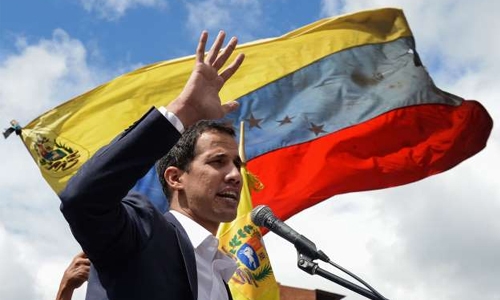Can Venezuela have a peaceful transition?
Just weeks ago, there was virtually no hope that Venezuela’s economic and humanitarian crisis would soon be eased. President Nicolás Maduro seemed to face no serious challenge to his increasingly repressive and corrupt rule. Despite some discontent in the armed forces, high-level officers appeared to stand with him. Today, with the appearance of a credible rival to Maduro, Venezuela’s future hinges on those very same officers.
Until now, Maduro has been particularly lucky that his political foes have been unable to cohere into an effective resistance with a clear strategy and forceful leadership. His opponents’ weakness was in part the result of repeated government crackdowns that instilled widespread fear. But on Jan. 23 it was evident that Maduro’s luck had run out and that void was being filled in dramatic fashion by a relatively unknown leader who declared himself the country’s legitimate president before thousands of supporters in Caracas.
His name is Juan Guaidó, and he is the 35-year-old president of the National Assembly who led the broad-based nationwide protests that demonstrated ordinary Venezuelans’ anger over Maduro’s rule. Guaidó, who was elected the assembly’s president only a few weeks ago, has been largely untainted by Venezuela’s tired political squabbles. His messaging stands in sharp contrast to that of previous opposition figures, who castigated Maduro and, before him, President Hugo Chávez, and were unable to connect with Venezuelans who approved of Chávez’s left-leaning policies.
Strikingly, the rally on Jan 23 featured protesters from across the socioeconomic spectrum, including some from areas that had once been Chavista strongholds. They seemed to be drawn to Guaidó’s refreshing style and vision of taking the country forward and not returning to the pre-Chávez era, an elite-dominated period of social inequality and economic collapse. A deepening economic crisis and sharp splits within the regime, coupled with increased pressure on Maduro by the United States and most of the international community (in part over the huge outflow of Venezuelan refugees), helped create the conditions that enabled Guaidó to make his claim to the presidency.
The Trump administration, the Organization of American States and most Latin American governments pointedly disputed Maduro’s legal basis for a second term after fraudulent elections last May and have openly embraced Guaidó as interim president and the National Assembly as the legitimate authority. The result is parallel governments — one with legitimacy and popular appeal, the other with real power. The question now is how Guaidó can move from his current position to actually exercising power and presiding over the transition that he and the opposition envision.
Everything points to the centrality of the armed forces. So far, the upper ranks appear to be remaining loyal to Maduro and either are not yet prepared to support Guaidó or are determined to quash his effort. A considerable segment of the opposition seems to be betting that once the military fully fathoms the dimensions of the government’s crisis and how much support Guaidó commands, it will turn against Maduro. That, however, does not seem likely. Many high-ranking military officers are, after all, responsible for serious human rights violations and have reportedly profited immensely from illicit activities.
It is doubtful they will readily give in if they face severe punishment. Unless high-level military officers can be given sufficient guarantees that they will not have to pay for their crimes, Guaidó’s path forward could be blocked. To his credit, he has shown he understands the crucial role of the military. He has appealed to them with nonvindictive messages, including persuading the National Assembly on Jan. 15 to adopt an amnesty law for those who act “in favor of the restitution of democracy in Venezuela.” Winning over the military will require patience and sophisticated and discreet negotiations.
The notion of “negotiations” is anathema to much of the opposition, given the failure of previous efforts at “dialogue.” But now that the tables have turned — the Maduro government is weaker and the opposition stronger — negotiations might well be more fruitful. For many, an amnesty for the military will be a bitter pill to swallow. The crimes committed have been monumental and there is understandably a demand for full accountability.
This delicate question risks dividing the opposition, and acceptance of Guaidó’s leadership will be essential. Venezuela should expect some tension between full justice and desirable political change. For Guaidó, the opposition, the United States and the international community, a peaceful, democratic transition should be the priority. If it’s not, there’s no telling when the nation will be able to emerge from its nightmare.
Related Posts

